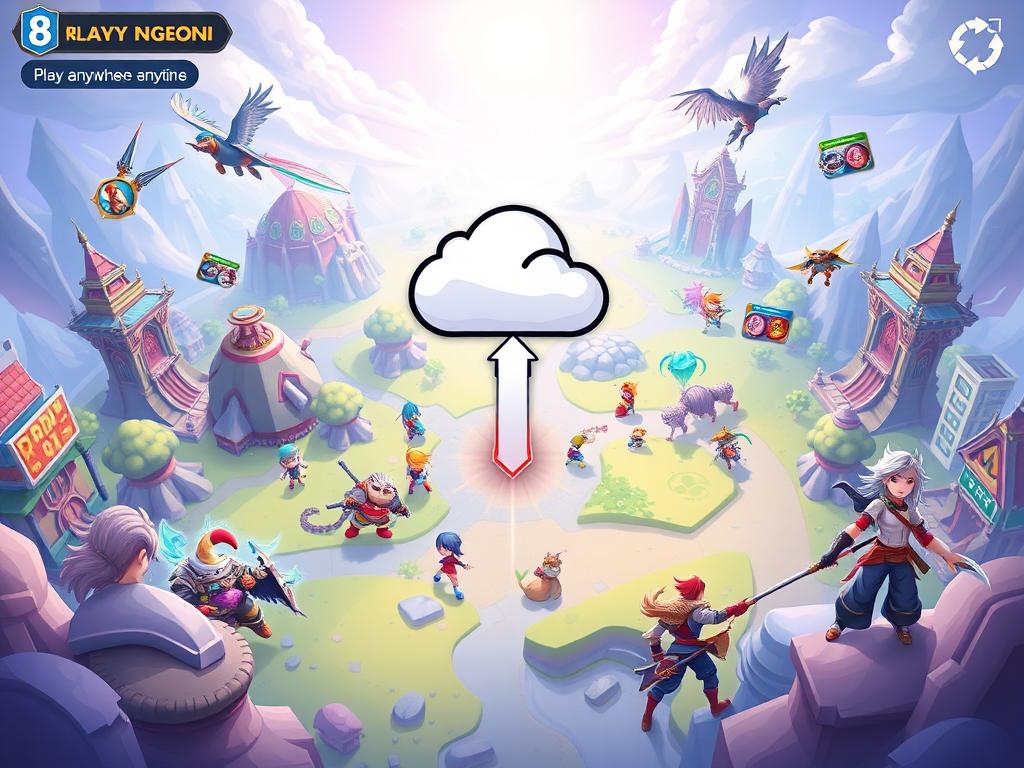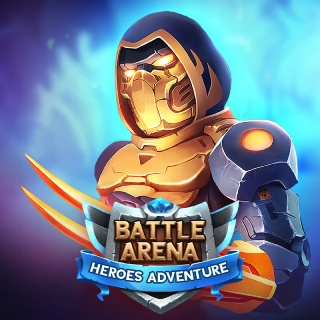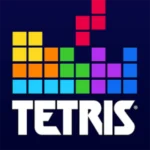Browser Games with Cross-Platform Progression: Play Anywhere, Anytime
The digital landscape of gaming has undergone a profound transformation, evolving from bulky installations and device-specific limitations to an era of unparalleled accessibility. At the forefront of this revolution are browser games, particularly those offering cross-platform progression. Imagine starting an epic quest on your desktop PC during a lunch break, then seamlessly continuing that same adventure on your tablet during your commute, and finally, picking it up again on your smartphone before bed. This isn’t a futuristic dream; it’s the reality enabled by play anywhere games that leverage robust cloud saves and intricate synchronization mechanisms. This article delves deep into the world of multi-device games, exploring how they deliver true seamless game progression, allowing you to immerse yourself in your favorite online games regardless of the device you’re using. Get ready to uncover the secrets behind this incredible gaming freedom.
The Evolution of Browser Gaming: From Niche to Necessity
The journey of browser games has been nothing short of remarkable. What began as simple Flash-based distractions, often found on casual gaming portals, has blossomed into a sophisticated ecosystem capable of delivering rich, engaging experiences. Early browser games were largely standalone entities, tied to the specific computer they were played on. If you started a game at home, your progress stayed at home. This fundamental limitation meant that while convenient for quick bursts of entertainment, these games lacked the persistent appeal of their downloadable counterparts.
The turning point arrived with the widespread adoption of open web technologies like HTML5, CSS3, and JavaScript. These technologies liberated online games from the constraints of proprietary plugins, opening the door to true cross-browser compatibility and, crucially, responsiveness across different screen sizes and input methods. Developers could now build games that ran natively within any modern web browser, irrespective of the operating system or hardware.
However, cross-browser compatibility was only half the battle. The real game-changer for accessibility was the advent of cross-platform progression. This innovation allowed players to carry their progress, achievements, and unlocked content across various devices. It transformed browser games from isolated experiences into a continuous stream of entertainment, perfectly fitting the modern, multi-device lifestyle. The demand for `play anywhere games` skyrocketed as users became accustomed to digital services that followed them from device to device. This shift wasn’t just about convenience; it was about integrating gaming seamlessly into the fabric of daily life, making it an ever-present, accessible pastime. The days of being tethered to a single machine to enjoy your favorite online games were drawing to a close, paving the way for the era of true multi-device games. For a deeper dive into how this genre has grown, explore the history of browser gaming.
Understanding Cross-Platform Progression: The Mechanics of Seamless Play
At its core, cross-platform progression refers to the ability to play a game on one device, save your progress, and then continue playing from that exact point on a different device. This seemingly magical feat relies on robust backend infrastructure and clever data management. The key enabler for this is the concept of `cloud saves` and account-based synchronization.
When you play a cross-platform browser game, your game state – including your character’s level, inventory, quest progress, and any custom settings – is not stored solely on your local device. Instead, it’s regularly uploaded to and synchronized with a central server, often referred to as “the cloud.” This server acts as the authoritative source for your game data. When you log into the same game on a different device (be it another desktop, a laptop, a tablet, or a mobile browser game on your smartphone), the game client on that device fetches your latest saved data from the cloud server. This ensures that you’re always picking up exactly where you left off, providing a truly `seamless game progression` experience.
The mechanics typically involve:
* User Accounts: Players create an account, usually linked to an email or a social media profile. This account serves as the unique identifier for their progress.
* Server-Side Data Storage: Game data is stored on remote servers, rather than on the player’s device. This makes it accessible from anywhere with an internet connection.
* API (Application Programming Interface) Integration: Game clients on different devices communicate with the server’s API to send and retrieve save data.
* Data Synchronization Logic: Sophisticated logic handles potential conflicts (e.g., if you play on two devices simultaneously, though most systems prevent this or prioritize the most recent save). It ensures data integrity and consistency across all linked devices.
This intricate dance between local game clients and remote servers is what empowers players to enjoy `play anywhere games`. It’s a testament to modern web development that such complex functionality can be delivered directly through a web browser, making multi-device games accessible to a massive audience without the need for dedicated app installations. The underlying architecture ensures that whether you’re battling foes in an RPG or solving puzzles in a casual title, your journey is continuous and uninterrupted.
The Unmatched Freedom of “Play Anywhere”: Why It Matters to Gamers
The concept of “play anywhere” isn’t just a marketing buzzword; it represents a fundamental shift in how people interact with their entertainment. For gamers, the freedom offered by cross-platform browser games is transformative. It eradicates the geographical and device-specific barriers that once confined gaming to a single location or a particular piece of hardware.
Consider the modern lifestyle: constantly on the move, juggling work, errands, social life, and family commitments. Traditional gaming, often requiring a dedicated console or a powerful gaming PC, doesn’t always fit into this dynamic. This is where `play anywhere games` shine.
* Uninterrupted Immersion: You no longer have to stop playing simply because you’re leaving your computer. Got five minutes before a meeting? Pull out your phone and chip away at a quest. Waiting for a train? Your tablet can be your portal to another world. This continuous engagement deepens immersion and prevents the frustration of interrupted progress, ensuring truly `seamless game progression`.
* Maximizing Downtime: Every spare moment becomes an opportunity to advance your game. What was once unproductive waiting time can now be transformed into valuable gaming sessions. This is particularly appealing for mobile browser games, which are designed for pick-up-and-play sessions.
* Personalized Device Choice: Some games are better suited for a larger screen and mouse/keyboard, while others thrive on touch controls. With cross-device gaming, players aren’t forced to choose. They can opt for the device that provides the best experience for a given situation, knowing their progress will follow. For instance, a complex strategy game might be preferred on a desktop, but a quick puzzle can be tackled on a phone.
* Social Connectivity: For online games that incorporate multiplayer elements, cross-platform progression means you can connect with friends regardless of their preferred device. This fosters a more inclusive and expansive gaming community.
* Reduced Barriers to Entry: The ease of access – no downloads, no installations, just open a browser and play – combined with the ability to `synchronize progress`, makes these games incredibly approachable. It removes friction, encouraging more people to dive into the gaming world.
This unparalleled freedom directly addresses the needs of a diverse gaming audience, from casual players seeking quick fun to dedicated enthusiasts who want their virtual worlds to be ever-present. It’s about empowering the player, putting them in control of when and where they engage with their digital adventures, making multi-device games an indispensable part of the modern entertainment landscape.
Technical Underpinnings: How Browser Games Achieve Cross-Device Compatibility
Achieving true `cross-platform progression` in browser games is a sophisticated engineering challenge, relying on a stack of powerful web technologies and clever design principles. The transition from Flash to open web standards was the crucial first step, but the devil, as always, is in the details of implementation.
The primary technologies enabling this widespread compatibility are:
* HTML5: The backbone of modern web content, HTML5 provides the structure for the game’s interface and elements. Its canvas element (`
Developers also employ smart optimization techniques:
* Asset Optimization: Images, audio, and other game assets are compressed and optimized for web delivery, often loading progressively to reduce initial load times.
* Client-Side Rendering: Most of the game logic and rendering occurs directly in the player’s browser, minimizing server load and improving responsiveness.
* Progressive Web Apps (PWAs): Some advanced browser games are built as PWAs, offering features like offline access, push notifications, and a native app-like experience directly from the browser, further enhancing the `play anywhere` ideal.
This combination of robust web technologies and thoughtful development practices ensures that modern `cross-platform browser games` can deliver high-quality, responsive experiences that genuinely offer `seamless game progression` across an astonishing array of devices.
The Role of Cloud Saves and Account Systems in Synchronized Progress
The backbone of any effective `cross-platform progression` system lies in its ability to manage and `synchronize progress` across disparate devices. This is where `cloud saves` and robust account systems step in, acting as the invisible threads that weave your gaming experience into a seamless tapestry. Without them, the promise of “play anywhere” would remain an elusive dream.
Cloud Saves: Your Digital Memory Bank
At its heart, a `cloud save` is a copy of your game data stored on remote servers, rather than solely on the local device you’re currently using. When you reach a save point, complete a level, or simply log out of a browser game, your progress is typically uploaded to this cloud server. When you then log back in from a different device – whether it’s a desktop, laptop, tablet, or a mobile browser game – the game client downloads the latest version of your save data, effectively restoring your game to the precise moment you left off. This mechanism is critical for ensuring `seamless game progression`.
Key aspects of `cloud saves` include:
* Data Redundancy: Storing data in the cloud provides inherent backups. If your local device crashes or is lost, your game progress remains safe and accessible.
* Scalability: Cloud infrastructure can easily scale to accommodate millions of player saves, handling fluctuating demand without compromising performance.
* Security: Reputable game developers and cloud service providers implement stringent security measures to protect player data from unauthorized access or corruption. This involves encryption, secure authentication protocols, and regular audits.
* Versioning: Some sophisticated `cloud save` systems may even maintain multiple versions of your game save, allowing you to revert to an earlier state if needed, though this is less common in casual browser games.
Account Systems: The Anchor for Your Identity
While `cloud saves` handle the data, account systems provide the essential framework for identifying and authenticating players across different devices. Without a unique identifier, the cloud wouldn’t know which save file belongs to which player.
Modern cross-platform browser games typically require players to create an account within the game’s ecosystem. This account serves several purposes:
* Unique Identification: Your account name or ID is linked directly to your `cloud save` data, ensuring that only you can access and modify your progress.
* Authentication: When you log in from a new device, the account system verifies your identity, typically through a username/password combination, email verification, or third-party logins (like Google, Facebook, or Apple IDs). This process securely retrieves your `synchronize progress` data.
* Social Features: Account systems often integrate with social features, allowing players to add friends, join guilds, or participate in leaderboards, further enhancing the `online games` experience.
* Monetization: For free-to-play browser games, account systems are also crucial for managing in-game purchases and virtual currencies, ensuring that acquired items are available across all devices.
Challenges in implementing these systems include managing data latency (ensuring saves are uploaded and downloaded quickly), resolving potential data conflicts (though rare in well-designed systems), and maintaining robust security against hacking attempts. Nevertheless, the benefits of `cloud saves` and interconnected account systems far outweigh these challenges, making them indispensable for delivering the truly `play anywhere` experience that defines modern `cross-platform browser games`. For strategies on winning and leveraging these features, see how to win at browser games.
Genres Thriving in the Cross-Platform Browser Space
The versatility of `cross-platform browser games` means that a wide array of genres can flourish under the “play anywhere, anytime” paradigm. While some highly demanding AAA titles might struggle without dedicated hardware, the breadth of experiences available is surprisingly vast, offering something for every type of gamer seeking `seamless game progression`.
Role-Playing Games (RPGs)
RPGs are a natural fit for cross-platform progression due to their emphasis on long-term character development, quest lines, and persistent worlds. Players can chip away at grand narratives, grind for gear, or explore vast landscapes incrementally, knowing their progress is always saved.
Examples often include text-based adventures, idle RPGs, or visually simpler turn-based combat games. The persistent nature of these `online games` makes them ideal for short bursts of play throughout the day, ensuring your hero’s journey never truly stops. For some of the best, check out best browser-based RPGs.
Strategy Games
From city-builders to real-time strategy (RTS) and turn-based tactics, strategy browser games benefit immensely from `cross-device gaming`. Managing resources, planning attacks, or developing your empire can be done meticulously on a desktop, then checked for quick updates or minor adjustments on a mobile device. The emphasis on thinking and planning over reflex-based actions makes them perfect for flexible play sessions. Many popular kingdom-building or civilization-style games are excellent examples of `multi-device games`. Explore some top browser strategy games.
Puzzle Games
Puzzle games are arguably one of the most accessible genres for `play anywhere games`. Their often self-contained levels and intuitive mechanics translate perfectly to touchscreens and quick sessions. Whether it’s a match-3, a logic puzzle, or a brain-teaser, players can jump in, solve a few puzzles, and then pick up exactly where they left off later. The satisfaction of solving a puzzle, combined with `seamless game progression`, makes these highly addictive. For a dose of brain-teasing fun, explore free browser-based puzzle games.
Idle Games / Incremental Games
These games are almost purpose-built for `cross-platform progression`. Their core mechanic revolves around passive progression, where the game continues to advance even when you’re offline. Players log in periodically to collect resources, upgrade structures, or unlock new content. This makes them ideal `multi-device games`, as you can check on your idle empire from any device, anytime, ensuring constant `synchronize progress`.
Casual Games and Arcade Games
This broad category encompasses a huge variety of quick-play titles, from endless runners and simple platformers to casual sports games. Their straightforward controls and instant gratification make them perfect for short bursts of entertainment. The ability to pause and resume at any moment, facilitated by `cloud saves`, makes them prime examples of `play anywhere games`. Consider titles like Subway Surfers Online which thrive on this model. For more addictive fun, check out the most addictive browser games.
Massively Multiplayer Online (MMO) Games
While often more graphically demanding, a growing number of MMO browser games are adopting `cross-platform progression`. These allow players to engage with persistent online worlds, interact with other players, and embark on grand adventures, shifting between desktop and `mobile browser games` as needed. The social aspect of these `online games` is further enhanced by broader accessibility.
The common thread across all these thriving genres is the inherent design that benefits from flexible, uninterrupted play. Developers are increasingly designing browser games with `cross-device gaming` in mind from the outset, leading to richer and more pervasive gaming experiences than ever before.
Optimizing Your Experience: Tips for Seamless Cross-Device Gaming
While browser games with `cross-platform progression` are designed for maximum convenience, there are several steps you can take to ensure your `seamless game progression` is as smooth and enjoyable as possible across all your devices. These tips focus on optimizing your environment, browser settings, and understanding the nuances of `cross-device gaming`.
1. Choose the Right Browser and Keep It Updated
Not all browsers are created equal when it comes to gaming performance. Modern browsers like Google Chrome, Mozilla Firefox, Microsoft Edge, and Apple Safari offer strong support for HTML5, WebGL, and JavaScript, but their rendering engines and resource management can differ.
* Experiment: If one browser feels sluggish, try another.
* Update Regularly: Browser updates often include performance enhancements, security fixes, and better support for web standards crucial for `online games`. Ensure your browser is always running the latest version.
2. Ensure a Stable Internet Connection
`Cloud saves` and `synchronize progress` mechanisms heavily rely on a consistent internet connection. A patchy Wi-Fi or mobile data connection can lead to:
* Save Errors: Incomplete save uploads, potentially leading to lost progress or out-of-sync data.
* Lag and Disconnects: Especially problematic for real-time `multi-device games`.
* Slow Loading: Game assets need to load efficiently.
Prioritize a strong, stable connection, especially when performing critical actions like saving or making in-game purchases.
3. Manage Browser Cache and Cookies
Over time, your browser accumulates cache and cookies, which can sometimes interfere with game performance or data synchronization.
* Clear Cache Regularly: This can resolve loading issues or display glitches.
* Enable Cookies: Ensure that cookies are enabled for the game’s website, as they are often used to maintain session data and link to your `cloud saves` or user account.
* For persistent issues, consider clearing site-specific data for the game. Learn more about fixing browser game loading issues.
4. Pay Attention to Account Security
Your game account is the key to your `cross-platform progression`. Protect it diligently:
* Strong Passwords: Use unique, complex passwords for your gaming accounts.
* Two-Factor Authentication (2FA): If offered, enable 2FA for an extra layer of security.
* Beware of Phishing: Be cautious of suspicious emails or links asking for your login credentials.
5. Optimize Device Performance (Especially for Mobile)
While `browser games` are designed to be lightweight, older or less powerful devices can still struggle.
* Close Unnecessary Tabs/Apps: Free up RAM and CPU resources.
* Restart Device: A simple restart can clear temporary files and improve performance.
* Check for System Updates: Operating system updates can improve overall device performance.
* Consider specific tips for optimizing your browser for gaming.
6. Understand Game-Specific Save Mechanics
Some browser games might have specific save points, auto-save intervals, or require manual saving. Familiarize yourself with these mechanics to ensure your `cloud saves` are always up-to-date before switching devices.
By following these practical tips, you can significantly enhance your `cross-platform progression` experience, allowing you to fully embrace the freedom of `play anywhere games` without unnecessary interruptions or frustrations.
The Business and Developer Perspective: Building for a Multi-Platform Future
From the viewpoint of game developers and publishers, the rise of `cross-platform browser games` with `seamless game progression` represents both a tremendous opportunity and a unique set of challenges. The landscape of `online games` development has been irrevocably altered by the demand for `play anywhere` accessibility.
Benefits for Developers and Publishers:
* Expanded Reach and Audience: By offering `cross-platform progression`, developers can tap into a much larger audience. Players are no longer restricted by their operating system or the specific device they own. A single codebase can cater to desktop, tablet, and `mobile browser games`, drastically increasing potential player count and market share. This is crucial for mass-market appeal and discoverability of `multi-device games`.
* Reduced Development Costs (Potentially): Developing for multiple native platforms (iOS, Android, Windows, macOS) often means maintaining separate codebases, hiring specialized teams, and undergoing complex approval processes. Building a single, robust HTML5 browser game with `cloud saves` can significantly reduce development and maintenance overhead, leading to a more efficient use of resources.
* Faster Iteration and Deployment: Web-based games can be updated instantly. Developers don’t need to wait for app store approvals or force users to download large patches. New features, bug fixes, and content can be deployed seamlessly, allowing for agile development cycles and continuous improvement of `online games`.
* Direct Player Access: Players can access browser games directly through a URL, bypassing app store fees and algorithmic gatekeepers. This allows for more direct monetization strategies and community building.
* Enhanced Monetization Opportunities: A larger, more engaged audience that can play anytime, anywhere, translates into more opportunities for in-app purchases, advertising, and subscription models. The convenience of `cross-device gaming` encourages consistent player engagement, which is vital for long-term revenue.
Challenges for Developers:
* Performance Optimization: Ensuring a game runs smoothly and consistently across a vast array of devices with varying hardware capabilities (from high-end PCs to older smartphones) is a complex task. Developers must meticulously optimize assets, code, and rendering to deliver a satisfying `play anywhere` experience.
* Input Method Adaptability: Designing intuitive controls that work equally well with a mouse and keyboard, touchscreens, and even gamepads requires thoughtful UX/UI design. This is a significant challenge for `multi-device games`.
* Security and Anti-Cheating: Browser environments can be more vulnerable to client-side manipulation than native applications. Developers must invest heavily in server-side validation and robust anti-cheat measures to protect game integrity and `synchronize progress` data.
* Data Synchronization Complexity: Implementing reliable `cloud saves` and `synchronize progress` systems is technically demanding. Handling network latency, potential conflicts, and ensuring data integrity across different regions and connection types requires robust backend architecture.
* Browser Inconsistencies: While web standards have improved, subtle differences in how various browsers implement HTML5, CSS3, and JavaScript can lead to unexpected bugs or performance variations, requiring extensive cross-browser testing.
* Monetization vs. User Experience: Balancing the need for revenue (e.g., through ads) with maintaining a `seamless game progression` experience is a constant tightrope walk. Aggressive advertising can drive players away.
Despite the challenges, the trend towards `cross-platform browser games` is undeniable. Developers who master the art of delivering `seamless game progression` across devices are positioning themselves at the forefront of the next wave of interactive entertainment, building experiences that are truly ubiquitous and deeply integrated into players’ lives.
Case Studies of Successful Cross-Platform Browser Games
To truly appreciate the power of `cross-platform progression`, it’s helpful to look at examples of browser games that have masterfully implemented this feature. These titles demonstrate how `seamless game progression` can unlock massive player bases and foster incredible engagement.
1. Slither.io and Agar.io: The Rise of .io Games
While not traditional story-driven games, the `.io` genre epitomizes the `play anywhere` philosophy. Games like Agar.io and Slither.io are prime examples of `online games` that offer `cross-device gaming` without explicit account systems. How do they achieve it? By simplifying progression to ephemeral sessions or requiring a quick, often anonymous, login. Your “progress” is typically session-based, but leaderboards and basic customization are often tied to a simple cookie or a quick guest login that can be carried over if you access it via the same browser/device combination. Some have introduced more persistent features tied to an optional account. Their success lies in their instant accessibility and addictive loop, proving that even simple `browser games` can benefit from this ubiquity.
2. AdventureQuest Worlds (AQW): A Pioneer in Web-Based MMOs
AdventureQuest Worlds, developed by Artix Entertainment, has been a long-standing example of a persistent `online game` playable directly in a browser. While it originated on Flash, its evolution into HTML5 demonstrates a commitment to `cross-platform progression`. Players create a single account, and all their character data, inventory, and quest progress are stored on central servers. This allows players to log in from any computer, anywhere, and continue their adventures without missing a beat. The community aspect and persistent world benefit immensely from this `play anywhere` design, making it a true `multi-device game` for its dedicated fanbase.
3. Forge of Empires: Strategic City-Building Across Devices
InnoGames’ Forge of Empires is a quintessential example of a `cross-platform browser game` that excels in the strategy genre. This city-building and strategy title allows players to manage their burgeoning empires across a web browser on a desktop or dedicated mobile apps (which synchronize with the browser version). The core of its `seamless game progression` lies in its robust `cloud saves` and account system. Whether you’re at home meticulously planning your city’s layout, or on the go quickly collecting resources and launching an attack via your phone, your progress is always up-to-date. This flexibility is crucial for a game that requires long-term commitment and regular check-ins. For more strategic depth, consider other strategy browser games.
4. Goodgame Empire: Another Strategic Juggernaut
Similar to Forge of Empires, Goodgame Empire allows players to build and manage their medieval empires directly from their browser, with full `cross-platform progression` across various devices. Its success is heavily attributed to the convenience it offers. Players can coordinate with alliances, launch attacks, or upgrade buildings from a laptop at a café or a tablet at home. The game’s design emphasizes continuous engagement, and the `cloud saves` system ensures that every strategic decision and every unit trained contributes to a single, consistent player experience, solidifying its status as a leading `multi-device game`.
These case studies underscore that whether a game focuses on quick, competitive sessions or deep, long-term progression, the ability to `synchronize progress` across devices is a critical factor in its success and player retention. They illustrate how `cross-platform browser games` are not just a convenience but a cornerstone of modern `online games` accessibility.
The Future of Cross-Platform Browser Gaming: What’s Next?
The trajectory of `cross-platform browser games` points towards an even more integrated, powerful, and ubiquitous future for `online games`. As web technologies continue to evolve at a rapid pace, the lines between what’s possible in a browser and what requires a native application are increasingly blurring. The ultimate vision of `play anywhere, anytime` is becoming ever clearer.
Emerging Web Technologies
* WebAssembly (Wasm): This low-level bytecode format offers near-native performance for web applications. Developers can write game logic in languages like C++ or Rust and compile it to WebAssembly, significantly boosting performance for complex browser games. This means more graphically intensive and computationally demanding `multi-device games` could become common in browsers, further enhancing `seamless game progression` capabilities.
* WebGPU: The successor to WebGL, WebGPU provides more direct access to a device’s GPU, enabling even more sophisticated graphics, advanced rendering techniques, and better performance for 3D environments. This will allow `cross-platform browser games` to achieve visual fidelity previously only seen in desktop or console titles.
* Advanced APIs: Expect new web APIs for better hardware integration (e.g., advanced gamepad support, improved audio processing, or even haptic feedback), allowing `browser games` to offer a more immersive and responsive experience across all devices.
Deeper Integration and Social Features
The future will likely see `cross-platform browser games` becoming even more deeply integrated into social platforms and communication channels. Imagine launching a game directly from a chat app, or seamlessly inviting friends to join your `online games` session, regardless of their device. This convergence will foster more vibrant and connected gaming communities, further solidifying the `play anywhere` experience.
Cloud Gaming and Streaming Evolution
While current `cross-platform browser games` run locally in your browser, the growth of cloud gaming services (like Xbox Cloud Gaming, GeForce Now, Google Stadia’s legacy) indicates a future where even the most demanding titles could be streamed directly to your browser, with `cloud saves` and `synchronize progress` being inherent to the model. This could blend the high-fidelity of traditional gaming with the accessibility of browser-based play, making any device a powerful gaming machine.
Enhanced Monetization and Business Models
As the ecosystem matures, developers will explore more diverse and sophisticated monetization models beyond traditional ads and in-app purchases. This could include battle passes, seasonal content, or even blockchain-enabled economies for certain types of `multi-device games`, all facilitated by robust `cross-platform progression` systems.
Accessibility and Inclusivity
The very nature of `browser games` promotes accessibility. As the technology advances, efforts will continue to ensure games are playable on a wider range of devices, including low-end PCs and older smartphones, further democratizing access to high-quality `online games`.
In essence, the future of `cross-platform browser games` is one of continuous innovation, pushing the boundaries of what’s possible within the web browser. The core promise of `play anywhere, anytime` will only grow stronger, ensuring that gaming remains an ever-present, accessible, and increasingly sophisticated form of entertainment for billions worldwide. The journey of `seamless game progression` is just beginning.
The Power of User Accounts: More Than Just a Login
For `cross-platform progression` to truly deliver `seamless game progression`, the user account system is paramount. It’s far more than just a gateway; it’s the central nervous system connecting your individual play history across a multitude of devices. Without a robust and secure account infrastructure, the concept of `play anywhere games` would collapse.
Think of your user account as your digital passport in the gaming world. When you log into a `browser game`, this passport identifies you to the server. This identity is then inextricably linked to your `cloud saves`, ensuring that all your progress, achievements, purchased items, and customization preferences are retrieved and loaded, regardless of whether you’re on a desktop, laptop, tablet, or a `mobile browser game`.
Key Functions of a User Account in Cross-Platform Gaming:
* Persistent Identity: Your account provides a unique identifier that persists across sessions and devices. This allows the game server to consistently track your progress and preferences.
* Authentication and Authorization: Beyond simple identification, the account system handles authentication (verifying you are who you say you are, typically with a password or social login) and authorization (ensuring you have the rights to access certain content or features based on your account status).
* Data Synchronization Hub: The account acts as the primary key for accessing your `cloud saves`. When you play, the game client constantly communicates with the server, updating your save file against your account ID. When you switch devices, the new client uses your account to pull the most recent version of your data, guaranteeing `synchronize progress`.
* Multiplayer and Social Features: In `online games`, your account enables interaction with other players. It’s how you add friends, join guilds, participate in global leaderboards, or engage in player-versus-player combat. This social layer is crucial for many `multi-device games` and is built entirely upon individual user accounts.
* Monetization and Entitlements: For free-to-play `browser games`, your account stores all your virtual currency, premium item purchases, and subscription statuses. This ensures that any money you spend on one device translates to benefits across all your connected devices, reinforcing the `play anywhere` value proposition.
* Personalization and Preferences: Beyond core game progress, your account can store settings like graphics quality, control schemes, UI preferences, and even cosmetic choices. This means your personalized gaming experience follows you, minimizing the need to reconfigure settings when you switch devices.
Security Considerations:
Given the centrality of user accounts, their security is paramount. Developers employ various measures:
* Encryption: Passwords and sensitive data are almost always encrypted both in transit and at rest.
* Hashing: Passwords are typically stored as one-way hashes, meaning even if a database is compromised, actual passwords aren’t directly exposed.
* Two-Factor Authentication (2FA): Increasingly common, 2FA adds an extra layer of security by requiring a second verification method (e.g., a code from your phone) in addition to your password.
* Session Management: Robust systems manage active sessions, detecting and sometimes flagging simultaneous logins from different locations to prevent unauthorized access.
The user account system is the unsung hero of `cross-platform progression`, quietly working in the background to ensure that your gaming journey is continuous, secure, and truly boundless across all your chosen devices. It transforms fragmented experiences into a unified, accessible gaming adventure.
Monetization Models and Sustainability in Cross-Platform Browser Games
The ability to offer `cross-platform progression` has not only enhanced player experience but also significantly impacted the business models and sustainability strategies for `browser games`. Developers must balance providing a compelling `play anywhere` experience with generating sufficient revenue to support ongoing development and server costs for their `online games`.
1. Free-to-Play with In-App Purchases (F2P/IAP)
This is by far the most dominant monetization model for `cross-platform browser games`.
* Core Concept: The game is free to access and play, leveraging the low barrier to entry of `browser games`. Revenue is generated through optional in-game purchases.
* IAP Types: These typically include cosmetic items (skins, emotes), convenience items (time savers, energy refills), power boosts (temporary buffs, rare resources), or premium currency.
* Cross-Platform Advantage: Purchases made on one device are immediately available across all linked devices via `cloud saves` and `seamless game progression`. This reinforces player investment and trust, as their purchases follow them wherever they play.
* Examples: Many popular `multi-device games` like city-builders, strategy games, and RPGs thrive on this model.
2. Advertising
Another common revenue stream, especially for more casual `browser games`.
* Core Concept: Displaying ads within the game (banner ads, interstitial ads, rewarded video ads).
* Rewarded Ads: Players choose to watch an ad in exchange for in-game currency, a boost, or an extra life. This model is player-friendly as it’s opt-in and provides tangible benefits.
* Cross-Platform Advantage: Ads can be seamlessly integrated across different device interfaces, adapting to screen size for `mobile browser games` or desktop.
* Balance is Key: Developers must carefully balance ad frequency and intrusiveness to avoid disrupting the `seamless game progression` and driving players away.
3. Subscription Models
Less common for pure `browser games` but gaining traction, often combined with F2P.
* Core Concept: Players pay a recurring fee for premium benefits like ad-free play, exclusive content, daily rewards, or accelerated progression.
* Cross-Platform Advantage: Once subscribed, benefits apply across all devices, making the subscription highly valuable for players seeking a truly `play anywhere` experience.
* Examples: Some persistent world `online games` or MMORPGs may offer optional subscriptions.
4. Battle Passes / Season Passes
Inspired by popular console/PC games, battle passes are becoming more prevalent in `multi-device games`.
* Core Concept: Players purchase a “pass” for a limited season and earn rewards (cosmetics, currency, unique items) by completing challenges and leveling up within that season.
* Cross-Platform Advantage: All progress towards the battle pass, and all rewards earned, are synchronized via `cloud saves`, making it a compelling offer for players who engage in `cross-device gaming`.
5. Premium (Paid) Games
A smaller segment, usually for more narrative-driven or high-production `browser games`.
* Core Concept: Players pay an upfront fee to access the full game.
* Cross-Platform Advantage: Once purchased, the game offers `seamless game progression` across devices. The challenge here is convincing players to pay upfront for a browser-based experience when many alternatives are free.
Sustainability and Future Trends:
* Data Analytics: Developers heavily rely on analytics to understand player behavior, optimize monetization, and identify areas for improvement. `Cross-platform progression` provides a unified view of player activity, regardless of device.
* Community Engagement: Fostering an active community through forums, social media, and in-game events is crucial for long-term retention. `Multi-device games` facilitate this by keeping players connected.
* Content Updates: Consistent delivery of new content, events, and features keeps players engaged and encourages continued spending. The agile deployment of `browser games` makes this easier.
Ultimately, the success of a monetization model in `cross-platform browser games` hinges on how well it integrates with the `seamless game progression` experience, providing value that truly resonates with players who expect to `play anywhere, anytime`.
Overcoming Challenges: Ensuring a Smooth Cross-Platform Experience
While `cross-platform progression` in `browser games` offers immense advantages, its implementation is not without its hurdles. Developers constantly navigate a complex web of technical and design challenges to ensure a truly `seamless game progression` for players across various devices. Understanding these challenges sheds light on the sophistication behind seemingly simple `play anywhere games`.
1. Device Fragmentation and Optimization
The sheer diversity of devices, screen sizes, input methods, and hardware capabilities presents a significant optimization challenge.
* Responsive Design: Games must adapt dynamically to different resolutions, aspect ratios, and orientations, ensuring UI elements are readable and interactive on a large desktop monitor as well as a compact `mobile browser game` screen.
* Performance Scaling: A game needs to run acceptably on both high-end gaming PCs and older smartphones. This often involves dynamic asset loading, adjustable graphics settings, and efficient code to prevent lag or crashes.
* Input Mapping: Seamlessly transitioning between mouse/keyboard input on desktop and touch controls on mobile devices requires intuitive and well-tested control schemes for `multi-device games`.
2. Data Consistency and Synchronization Conflicts
Maintaining perfect `synchronize progress` across multiple devices is critical but complex.
* Race Conditions: What happens if a player rapidly makes changes on two different devices? Robust `cloud saves` systems need to handle potential data conflicts, typically by prioritizing the most recent timestamped save or by preventing simultaneous writes.
* Offline Play and Resynchronization: While many `browser games` require an internet connection, some offer limited offline capabilities. Reconciling offline progress with the cloud when the player reconnects adds another layer of complexity.
* Latency: Network latency can cause delays in `cloud saves` uploading or downloading, potentially leading to moments where a player’s perceived progress isn’t fully up-to-date on a new device.
3. Security and Anti-Cheat Measures
Web environments, by their open nature, can sometimes be perceived as less secure than closed native applications.
* Client-Side Manipulation: Preventing players from modifying game files or exploiting vulnerabilities in the browser to cheat requires strong server-side validation for all critical game logic and progress updates.
* Account Hacking: Protecting `cloud saves` and user accounts from unauthorized access is paramount, demanding robust encryption, secure authentication (like 2FA), and continuous monitoring.
4. Browser and Platform Inconsistencies
Despite standardization efforts, different web browsers (Chrome, Firefox, Edge, Safari, etc.) and underlying operating systems (Windows, macOS, Android, iOS) can render web content and execute JavaScript slightly differently.
* Rendering Glitches: Minor visual inconsistencies or bugs can appear on one browser but not another.
* Performance Discrepancies: A game might run smoothly on Chrome but encounter frame rate drops on Safari due to differences in JavaScript engine optimization or WebGL implementation.
* Testing Burden: Developers must conduct extensive `cross-browser` and `cross-device` testing to catch and resolve these inconsistencies, a significant undertaking for `online games` that promise `play anywhere` functionality.
5. Monetization Integration and User Experience
Integrating ads and in-app purchases without disrupting the `seamless game progression` is a delicate balance.
* Ad Fatigue: Too many or poorly placed ads can quickly alienate players.
* Purchase Failures: Ensuring secure and reliable transaction processing across different browsers and devices is crucial for player trust.
Overcoming these challenges requires a combination of cutting-edge web development expertise, rigorous testing, and a deep understanding of user experience. When done successfully, the result is a truly liberating `cross-platform browser game` that delivers on the promise of uninterrupted, `play anywhere` entertainment.
The Social Dimension: Multiplayer and Community in Cross-Platform Browser Games
The ability to offer `cross-platform progression` not only liberates individual players but also profoundly enhances the social dimension of `browser games`. For `online games`, especially those designed for interaction, `cross-device gaming` transforms how communities form and thrive, making `play anywhere` a shared experience.
Breaking Down Barriers to Multiplayer
Historically, multiplayer gaming often meant being on the same console, the same PC platform, or at least having the same version of a game installed. `Cross-platform browser games` obliterate these barriers.
* Device Agnostic Friendships: Players can connect and compete with friends regardless of whether one is on a desktop, another on a tablet, and a third on a `mobile browser game`. This inclusivity expands friend networks and makes it easier for groups to play together.
* Wider Player Pools: For competitive `online games`, `cross-platform progression` means a larger pool of players for matchmaking, leading to faster queue times and more balanced matches. This is particularly evident in `.io` games where players globally compete on a level playing field, accessible via any web browser. Explore more about what are .io games.
* Persistent Guilds and Alliances: In MMORPGs or strategy `multi-device games`, guilds and alliances can maintain constant activity. Members can log in from any device to contribute to guild quests, coordinate attacks, or simply chat, ensuring `seamless game progression` for the collective.
Enhancing Community and Engagement
The continuous accessibility afforded by `cross-platform progression` naturally fosters stronger communities.
* Always-On Communication: Many `browser games` integrate in-game chat features that are accessible across all devices. This allows players to stay connected with their guildmates or friends even when they are away from their primary gaming setup.
* Shared Progress and Goals: When individual `seamless game progression` is synchronized, it naturally feeds into collective goals. Whether it’s contributing to a guild’s overall power in a strategy game or collaborating on a raid in an RPG, shared progress is consistently visible and accessible to everyone involved.
* Community-Driven Content: Some `online games` encourage user-generated content or shared creations. `Cross-device gaming` ensures that these community contributions are accessible and enjoyable for a broader audience, encouraging more participation.
* Live Events and Global Challenges: Developers can host timed events or global challenges that players can participate in from any device, building a sense of shared experience and excitement around the `browser game`.
Challenges and Considerations for Social Integration:
* Input Method Disparity: While unified controls are ideal, some games may struggle to balance complex inputs (e.g., precise aiming on a desktop) with simpler mobile touch controls in competitive scenarios.
* Fairness and Balance: Developers must ensure that `cross-platform progression` doesn’t inadvertently create an unfair advantage for players on certain devices (e.g., a mouse and keyboard player having a significant edge over a touchscreen player in a fast-paced action game).
* Chat Moderation: With a broader player base, effective content moderation across all platforms becomes even more critical for maintaining a positive community environment.
* Seamless Connectivity: The backend infrastructure must be robust enough to handle potentially millions of concurrent connections and `synchronize progress` updates for `online games` to prevent lag or disconnects during multiplayer sessions. For more on this, see multiplayer browser games.
Ultimately, `cross-platform progression` is not just about individual convenience; it’s about building vibrant, inclusive, and persistent gaming communities that transcend hardware limitations. It allows players to truly `play anywhere` with anyone, strengthening the social fabric of `browser games` and cementing their place in the modern gaming landscape.
Conclusion: The Ubiquitous Future of Browser Gaming
The journey through the world of `browser games` with `cross-platform progression` reveals a gaming paradigm fundamentally reshaped by accessibility and convenience. We’ve seen how these `play anywhere games` have evolved from simple Flash distractions to sophisticated `online games` powered by HTML5, WebGL, and robust backend systems. The core innovation lies in their ability to deliver `seamless game progression` across an array of devices, from desktop PCs and laptops to tablets and `mobile browser games`. This freedom, driven by intelligent `cloud saves` and intricate `synchronize progress` mechanisms tied to user accounts, has become a non-negotiable expectation for modern players.
This article has delved into the technical foundations that enable this magic, from responsive design and WebSockets to the critical role of user accounts in maintaining a persistent player identity. We explored the diverse genres that thrive in this environment, from strategic epics to quick puzzle challenges, all benefiting from the `cross-device gaming` model. Furthermore, we’ve examined the strategic decisions developers face, balancing opportunity with the complex challenges of optimization, security, and consistent data management for `multi-device games`. The future promises even more power with WebAssembly and WebGPU, ensuring that `browser games` continue to push boundaries. The ultimate conclusion is clear: the era of truly ubiquitous gaming is upon us, with `cross-platform browser games` leading the charge, allowing billions to `play anywhere, anytime`, ensuring that their adventures never stop, no matter where life takes them.


































































